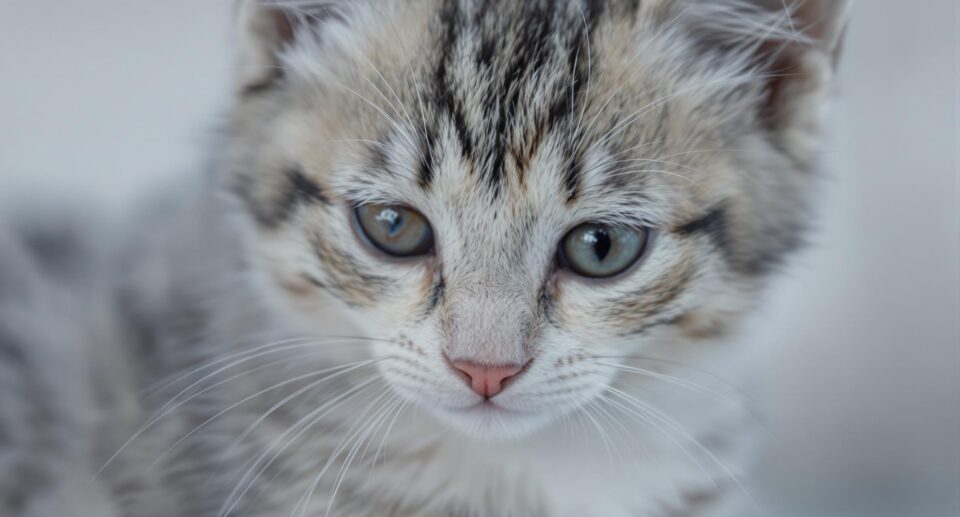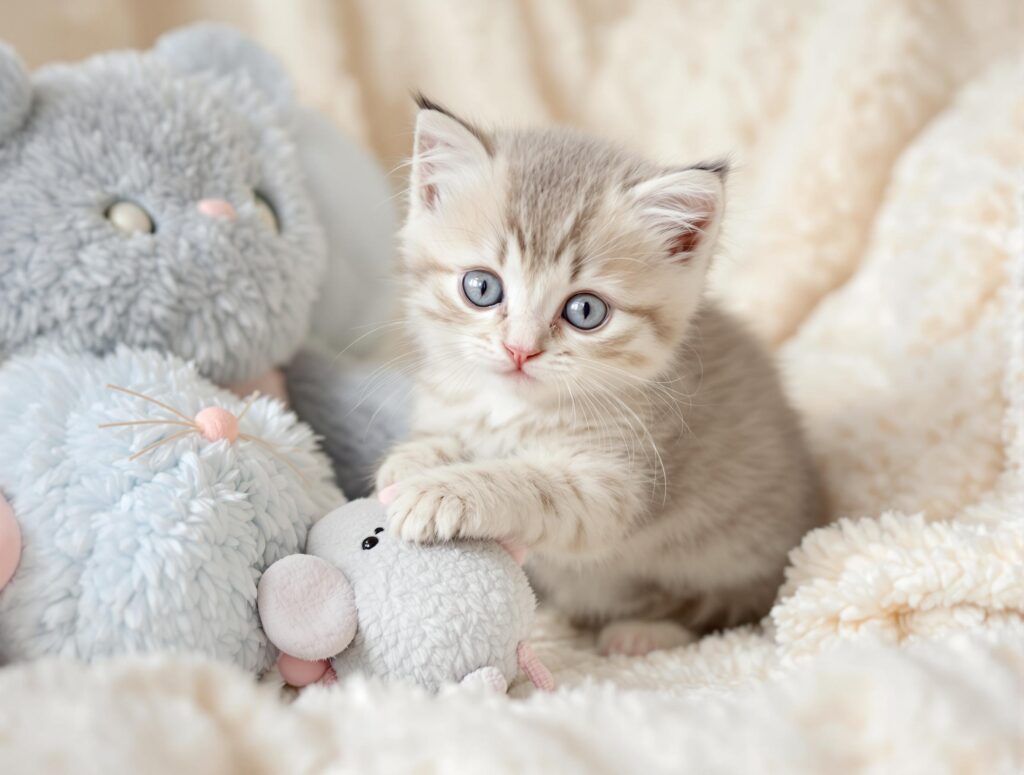Spotting Signs: How Do You Know if a Kitten is Blind?

Key Takeaways
- Early signs of potential vision impairment in kittens include hesitation around familiar spaces, eye appearance changes, and unusual head positioning, highlighting the importance of regular veterinary check-ups.
- Blindness in kittens may arise from factors like eye infections, injuries, or genetic conditions, and recognizing these early ensures timely and tailored veterinary care.
- A safe home setup with consistent furniture placement and sensory markers can greatly enhance a blind kitten’s sense of security and independence.
Recognizing the Signs of Kitten Blindness
When you’re raising a kitten, you naturally keep an eye on how they grow, play, and explore. If your kitten isn’t reacting the way you expect, you might start wondering about their vision. In this article, you’ll learn what can cause blindness in kittens, how to recognize the signs, and what you can do to support a blind or visually impaired kitten at home.
If you think your kitten may be having trouble seeing, schedule a check-up with your veterinarian. A professional exam can help you understand what’s going on and guide the best care plan. PetHealthMD offers tools and resources to help you stay informed and feel confident about your kitten’s health.
Your kitten should naturally burst with energy, eagerly pouncing on toys and chasing anything that moves. That’s why changes in this playful behavior can signal vision problems developing. Here are a few things to look out for:
- Sudden changes in behavior, such as hesitation around familiar furniture, reluctance to explore new spaces, or keeping their head unusually low while walking.
- Physical changes in their eyes, including:
- Pupils that stay consistently wide and do not adjust properly to light
- Cloudiness or puffiness around the eyes
- Unusual eye coloration
- Pupils that stay consistently wide and do not adjust properly to light
Notice how your kitten navigates their daily life—these observations provide valuable clues about their visual health that complement what your veterinarian can discover during check-ups. Your attention to these subtle details can make a world of difference in your kitten’s quality of life.
What Causes Blindness in Kittens?
Understanding what causes blindness in kittens can help you spot potential problems early. Eye infections and injuries are among the most common reasons kittens experience vision problems. Regular monitoring for signs like discharge, squinting, or pawing at the eyes allows you to act quickly when your kitten needs care.
Medical conditions can affect your kitten’s sight in different ways. Simple infections can develop into more serious problems without proper treatment. When you notice changes in your kitten’s eyes or behavior, a veterinarian can perform specific examinations to identify the underlying cause and recommend treatment options to help preserve your little one’s sight.
Some kittens face eye health challenges due to their family history. Early-life exposure to certain viruses or inherited eye conditions can affect vision development. Your veterinarian can help you understand your kitten’s specific needs and create a caring plan to support their eye health.
For added care, explore our Cat Eye Care category for helpful products that support feline eye health.

Practical Tips on Caring for a Blind Kitten
Caring for a blind kitten is easier when you understand their unique needs. These organized tips will help you create a safe, loving environment where your kitten can thrive.
Create a Safe Environment
- Set up an initial adjustment space in a single room with low furniture and padded corners.
- Place textured mats or rugs as sensory landmarks near important areas like food bowls and litter boxes.
- Install baby gates near stairs and keep windows securely screened.
- Maintain consistent furniture placement – cats rely on mental mapping for navigation.
Establish Comforting Routines
- Create a two-week adjustment period in their dedicated space before introducing new areas.
- Keep food, water, and litter boxes in fixed locations.
- Set regular feeding and playtime schedules.
- Brief all family members about maintaining these consistent routines.
Interactive Care
- Choose toys that engage other senses – crinkle balls, bell-filled mice, or interactive cat toys.
- Announce your presence with soft, gentle words before approaching or touching.
- Use verbal cues like “dinner time” or “play time” to help your kitten anticipate activities.
- Reward exploration with praise and treats to build confidence.
Can a Kitten Regain Vision?
Vision recovery in your kitten depends on what’s causing their visual problems. Getting help early can make a difference in treatment success. Your quick action in seeking veterinary care gives your pet their best chance at improvement, even when full vision restoration isn’t possible.
Working together with your veterinarian through regular check-ups allows for personalized treatment plans, maximizing opportunities for vision improvement. Eye infections and inflammation frequently respond positively to proper medical care, offering hope for vision restoration in many cases. Immediate medical attention for sudden vision changes significantly improves treatment outcomes – even hours can impact your kitten’s healing process.
Creating comfort through consistent feeding spots, familiar play areas, and gentle handling supports your kitten’s healing journey, whether partial or complete. While some kittens experience full recovery, others adapt to life with limited vision by developing their other senses.
Frequently Asked Questions About Kitten Blindness
What should I do if I suspect my kitten is blind?
Book a check-up with your veterinarian. Early detection helps provide the best care for your kitten. If you notice changes in eye appearance, unusual behavior around familiar objects, or difficulty with coordination, professional guidance will help determine the most appropriate care path.
How can I make my home safer for a blind kitten?
Maintain steady furniture positions and add soft padding to sharp corners to create a consistent, nurturing environment. Place textured mats strategically—near food and water bowls, favorite resting spots, and along common walking paths—to help your kitten navigate confidently through your home.
Is blindness common in kittens?
Several underlying factors can affect a kitten’s sight. Some cases stem from inherited traits, while others may develop from environmental factors or health conditions.
What toys work best for blind kittens?
Select toys that engage multiple senses and encourage natural exploration. Toys with gentle bells, crinkly materials, or varying textures help stimulate your kitten’s remaining senses while building confidence during playtime. Explore our Cat Toys selection for options that support sensory play.
How often should you visit a veterinarian?
Plan regular wellness visits every 3-4 months for comprehensive eye examinations and overall health monitoring. These check-ups typically include pressure testing, retinal examinations, and assessment of your kitten’s adaptation to its environment, helping prevent or manage developing conditions.
Supporting Your Sight-Impaired Kitten
Welcoming a sight-impaired kitten into your home calls for patience and thoughtful adjustments to your living space. Though these special little ones face unique challenges, they can absolutely lead happy, fulfilled lives with your support and understanding.
Your kitten has remarkable adaptability, quickly learning to navigate their world using their other heightened senses. They’ll map their surroundings through their sensitive whiskers, keen sense of smell, and sharp hearing abilities. With consistent arrangement of their essentials (food, water, litter box) and some safe spaces to explore, your visually challenged companion will develop confidence and independence in their home environment.
For more comprehensive information about specialized kitten care and products that support feline health, visit our Cat Health & Wellness category.





